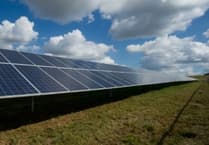THE Government must concentrate on narrowing the UK’s food deficit rather than undermining farmers through ‘dubious’ import deals, says West Somerset MP Ian Liddell-Grainger.
Mr Liddell-Grainger wants Ministers to think more of stepping up domestic food production rather than allowing productive land to be covered with solar farms or carbon off-setting forestry.
And, he said, this year’s events in Ukraine showed just how perilous it could be to rely on other countries for nearly half the food the UK consumed.
He was speaking after meeting senior National Farmers’ Union officials at a Westminster event to mark Back British Farming Day.
Mr Liddell-Grainger said the Government needed a major re-think of its entire food and farming policy, ranging from how best to support farmers facing input cost rises of more than 30 per cent to showing families facing steep increases in food bills how to turn basic ingredients into cheap, nourishing meals.
“What is abundantly clear is that the shockwaves sent through world food markets by the war in Ukraine have brought to an end the cosy situation where we could get away with only producing 60 per cent of our food needs and relying on others to send us the rest,” he said.
Figures recently released by the Country Landowners’ Association showed oats, barley, lamb. and milk were the only commodities where UK production exceeded demand.
The nation was 75 per cent self-sufficient in foods that could be produced in the UK but overall imported 46 per cent of the food which was eaten.
Nearly 40 per cent by value of feed, food, and drink imports came from just four EU countries - Holland, Ireland, Germany, and France.
Mr Liddell-Grainger said: “Think of it in these terms: we can feed ourselves from the beginning of the week to around lunchtime on Thursday, and after that we have to look abroad.
“That is clearly not a comfortable situation to be in.
“But rather than signing up to dubious deals which threaten to flood the shelves of British shops with inferior food produced to welfare standards way below ours, we should be encouraging our own farmers to produce more.
“We should also be looking on the effects of climate change as an opportunity enabling us to broaden the range of crops we can grow here.
“It is already happening - we have apricots being grown commercially in East Anglia now.
“But it will still come back to the Government providing the correct measure of support for the farming community - this country’s most valuable asset.”




